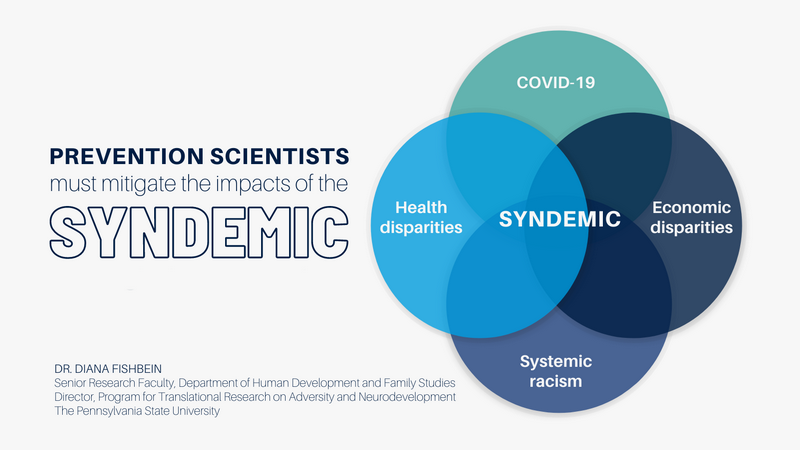The Lancet - COVID-19 is a Syndemic, Not a Pandemic!

The Lancet - Richard Horton - Published: September 26, 2020
COVID-19 is not a pandemic. It is a syndemic. The syndemic nature of the threat we face means that a more nuanced approach is needed if we are to protect the health of our communities.
Researchers have revealed that Covid-19 pandemic came as a double blow for people with non-communicable diseases (NCDs) such as diabetes, cancer, respiratory problems or cardiovascular conditions.
Assessing the "synergistic" impact of Covid-19 on such people, the researchers found that there has never been a more dangerous time for them than the ongoing pandemic.
According to the study, the Covid-19 'syndemic' would persist, just as the NCDs affected people in the long-term.
As the world approaches 1 million deaths from COVID-19, we must confront the fact that we are taking a far too narrow approach to managing this outbreak of a new coronavirus. We have viewed the cause of this crisis as an infectious disease. All of our interventions have focused on cutting lines of viral transmission, thereby controlling the spread of the pathogen. The “science” that has guided governments has been driven mostly by epidemic modellers and infectious disease specialists, who understandably frame the present health emergency in centuries-old terms of plague. But what we have learned so far tells us that the story of COVID-19 is not so simple.
Two categories of disease are interacting within specific populations—infection with severe acute respiratory syndrome coronavirus 2 (SARS-CoV-2) and an array of non-communicable diseases (NCDs). These conditions are clustering within social groups according to patterns of inequality deeply embedded in our societies. The aggregation of these diseases on a background of social and economic disparity exacerbates the adverse effects of each separate disease. COVID-19 is not a pandemic. It is a syndemic. The syndemic nature of the threat we face means that a more nuanced approach is needed if we are to protect the health of our communities.
The notion of a syndemic was first conceived by Merrill Singer, an American medical anthropologist, in the 1990s. Writing in The Lancet in 2017, together with Emily Mendenhall and colleagues, Singer argued that a syndemic approach reveals biological and social interactions that are important for prognosis, treatment, and health policy. Limiting the harm caused by SARS-CoV-2 will demand far greater attention to NCDs and socioeconomic inequality than has hitherto been admitted. A syndemic is not merely a comorbidity. Syndemics are characterised by biological and social interactions between conditions and states, interactions that increase a person's susceptibility to harm or worsen their health outcomes. In the case of COVID-19, attacking NCDs will be a prerequisite for successful containment. As our recently published NCD Countdown 2030 showed, although premature mortality from NCDs is falling, the pace of change is too slow.
The total number of people living with chronic diseases is growing. Addressing COVID-19 means addressing hypertension, obesity, diabetes, cardiovascular and chronic respiratory diseases, and cancer. Paying greater attention to NCDs is not an agenda only for richer nations. NCDs are a neglected cause of ill-health in poorer countries too. In their Lancet Commission, published last week, Gene Bukhman and Ana Mocumbi described an entity they called NCDI Poverty, adding injuries to a range of NCDs—conditions such as snake bites, epilepsy, renal disease, and sickle cell disease. For the poorest billion people in the world today, NCDIs make up over a third of their burden of disease. The Commission described how the availability of affordable, cost-effective interventions over the next decade could avert almost 5 million deaths among the world's poorest people. And that is without considering the reduced risks of dying from COVID-19.
• View related content for this article
The most important consequence of seeing COVID-19 as a syndemic is to underline its social origins. The vulnerability of older citizens; Black, Asian, and minority ethnic communities; and key workers who are commonly poorly paid with fewer welfare protections points to a truth so far barely acknowledged—namely, that no matter how effective a treatment or protective a vaccine, the pursuit of a purely biomedical solution to COVID-19 will fail. Unless governments devise policies and programmes to reverse profound disparities, our societies will never be truly COVID-19 secure.
As Singer and colleagues wrote in 2017, “A syndemic approach provides a very different orientation to clinical medicine and public health by showing how an integrated approach to understanding and treating diseases can be far more successful than simply controlling epidemic disease or treating individual patients.” I would add one further advantage. Our societies need hope. The economic crisis that is advancing towards us will not be solved by a drug or a vaccine. Nothing less than national revival is needed. Approaching COVID-19 as a syndemic will invite a larger vision, one encompassing education, employment, housing, food, and environment. Viewing COVID-19 only as a pandemic excludes such a broader but necessary prospectus.

Article Info
Publication History - Published: 26 September 2020
Identification DOI: https://doi.org/10.1016/S0140-6736(20)32000-6
HERE IS A STATISTICS BOMB FROM THE SENATE
COPYRIGHTS
Copy & Paste lenken øverst for Yandex oversettelse til Norsk.
WHO and WHAT is behind it all ? : >
The bottom line is for the people to regain their original, moral principles, which have intentionally been watered out over the past generations by our press, TV, and other media owned by the Illuminati/Bilderberger Group, corrupting our morals by making misbehaviour acceptable to our society. Only in this way shall we conquer this oncoming wave of evil.
Commentary:
Administrator
HUMAN SYNTHESIS
All articles contained in Human-Synthesis are freely available and collected from the Internet. The interpretation of the contents is left to the readers and do not necessarily represent the views of the Administrator. Disclaimer: The contents of this article are of sole responsibility of the author(s). Human-Synthesis will not be responsible for any inaccurate or incorrect statement in this article. Human-Synthesis grants permission to cross-post original Human-Synthesis articles on community internet sites as long as the text & title are not modified.
The source and the author's copyright must be displayed. For publication of Human-Synthesis articles in print or other forms including commercial internet sites. Human-Synthesis contains copyrighted material the use of which has not always been specifically authorized by the copyright owner. We are making such material available to our readers under the provisions of "fair use" in an effort to advance a better understanding of political, economic and social issues. The material on this site is distributed without profit to those who have expressed a prior interest in receiving it for research and educational purposes. If you wish to use copyrighted material for purposes other than "fair use" you must request permission from the copyright owner.